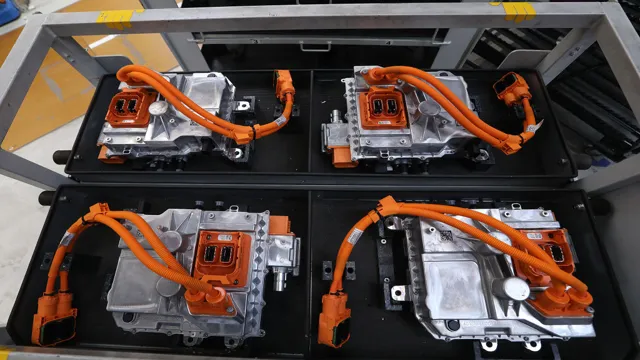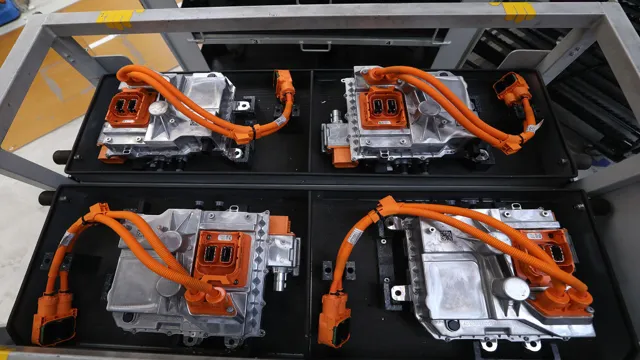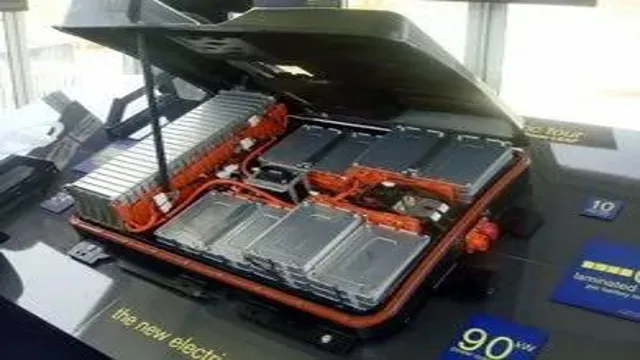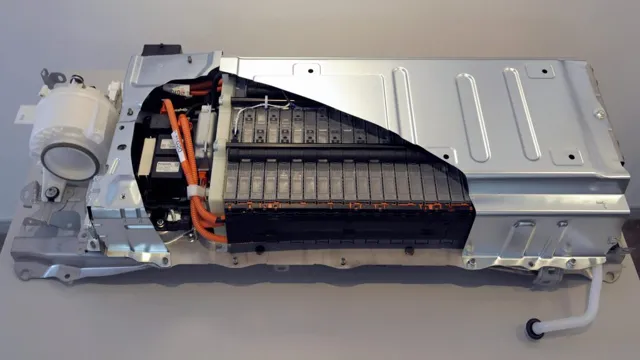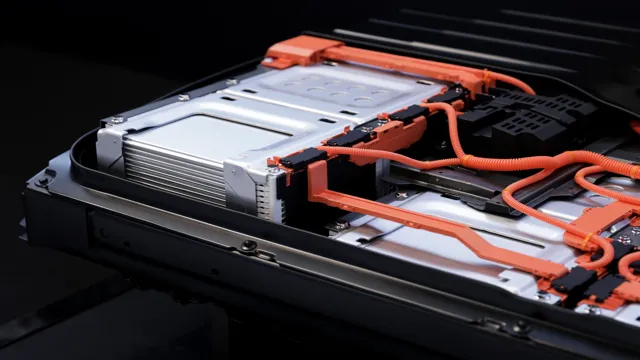7 Shocking Reasons behind Electric Car Battery Explosions You Can’t Ignore
Electric cars are hailed as a more sustainable and eco-friendly transportation option for the modern world compared to traditional gasoline-powered vehicles. However, there is one major concern that has been haunting the electric car industry – battery explosions. While these incidents are rare, they are a cause of worry for many potential buyers who are now questioning the safety of electric car batteries.
In this blog post, we will dive into the issue of electric car battery explosions, exploring what causes them, how common they are, and what manufacturers are doing to prevent them. Whether you’re a current electric car owner or considering switching to one, read on to learn more about this crucial safety concern.
Causes and Frequency
Electric car battery explosions have become a growing concern in recent times. These explosions happen when the battery of an electric car overheats or experiences some form of mechanical damage. The primary cause of the overheating can be attributed to several reasons, including excessive usage, extreme temperatures, and overcharging.
The frequent use of electric cars can cause the battery to undergo serious wear and tear, reducing its efficiency and possibly leading to explosions. These explosions can occur without warning, resulting in severe damage to the car and posing a potential safety hazard to those involved. It is vital to ensure that electric vehicles are maintained regularly, and vehicle owners should be made aware of the signs indicating that something is wrong with the battery to prevent accidents.
While electric cars have many significant benefits, such as being environmentally friendly and cost-effective, the risk of battery explosions is an issue that requires constant attention to keep everyone safe.
Lithium-ion Battery Chemistry
Lithium-ion battery chemistry is a complex topic, but one that is essential for understanding the causes and frequency of battery failure. One of the main causes of battery failure is overcharging, which can cause the battery to heat up and eventually explode. This can be due to a faulty charger or simply leaving a device plugged in for too long.
Over-discharging can also lead to battery failure, as it can cause the battery to be unable to hold a charge. Additionally, exposure to extreme temperatures, such as leaving a device in a hot car, can also damage the battery. While lithium-ion batteries are generally safe and reliable, it is important to be aware of these potential causes of failure and take steps to prevent them from occurring.
By taking care of your device and using it responsibly, you can help ensure that your battery remains in good working order for as long as possible.
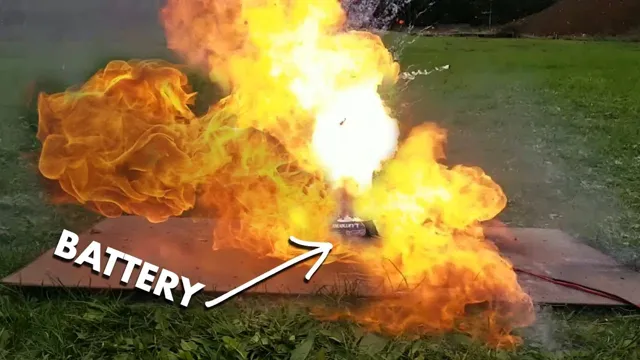
Poor Manufacturing or Design
Poor manufacturing or design is a common issue that can cause a variety of problems with products. This problem occurs when a product is not made correctly or the design is flawed from the start. This can happen for a variety of reasons, including inadequate testing, using subpar materials, or simply not enough experience in the manufacturing process.
The frequency of this issue can vary depending on the product and the manufacturer. Some manufacturers take great care to ensure that their products are made with the highest quality materials and with the utmost attention to detail, while others may cut corners to save money and time. Regardless of the cause, poor manufacturing or design can lead to a range of problems, including safety concerns, reduced durability, and decreased usability.
When faced with this issue, it is important to address the root cause of the problem and make the necessary changes to ensure that the issue does not happen again in the future. By investing in quality materials, conducting regular testing, and hiring experienced professionals, manufacturers can avoid the pitfalls of poor manufacturing and design and provide their customers with products that are safe, reliable, and built to last.
Battery Overheating and Thermal Runaway
Battery overheating is a common problem that can lead to a more serious issue called thermal runaway. It happens when the heat generated by the battery exceeds its ability to dissipate it, causing a chain reaction that increases the temperature rapidly. Several factors can contribute to battery overheating, including overcharging, short-circuiting, and physical damage.
The frequency of these incidents can vary, depending on the quality and age of the battery, as well as the conditions in which it is used. For instance, batteries used in high-temperature environments or exposed to direct sunlight are more susceptible to overheating. To avoid this issue, it’s crucial to use batteries that are designed for the intended application and to follow the manufacturer’s recommendations for storage, charging, and maintenance.
Additionally, it’s essential to monitor the temperature of the battery and stop using it if it becomes too hot. Remember that battery overheating can be dangerous, causing fires, explosions, or even injuries. So, always take battery safety seriously and be aware of the risks involved.
Recent Incidents and Impacts
Electric car battery explosions have been making headlines recently, sparking concerns about the safety of these vehicles. While rare, incidents have occurred where electric car batteries have exploded, causing damage to surrounding vehicles and structures. One such incident occurred in Shanghai in 2019 when a Tesla Model S caught fire in a parking garage, causing smoke to billow and flames to spread to other vehicles.
It’s important to note that explosions can be caused by a variety of factors, including faulty battery cells and external damage. However, it’s worth mentioning that electric cars are still safer than gasoline-powered cars, as they have a lower risk of catching fire and cause less damage in the event of an accident. Nonetheless, manufacturers are working to improve battery safety and prevent incidents from occurring in the future.
Explosions in Tesla and other Brands
The recent incidents of explosions in Tesla and other brands have sent shockwaves through the automotive industry. These incidents have not only posed a danger to drivers and passengers but also raised concerns about the safety of electric cars. While Tesla is the most talked-about brand, other car manufacturers have also experienced similar explosions.
The causes of these incidents vary from battery malfunction to poor maintenance. The impact of these explosions has been significant, both financially and in terms of reputation. Companies have had to recall thousands of cars, face lawsuits, and deal with negative PR.
However, it’s essential to note that incidents like these are rare, and electric cars are generally safe. Car manufacturers have stringent safety measures in place, and incidents like these are thoroughly investigated to prevent them from occurring again. As we continue to transition towards electric vehicles, safety will remain a top priority in the industry.
Safety Concerns and Recalls
Safety Concerns and Recalls are always hot-button issues when it comes to consumer products, especially those that are popular and widely used. In recent times, incidents have occurred where products have caused harm to individuals or property, leading to significant impacts on businesses and the affected parties. For instance, the massive recall of faulty airbags made by Takata impacted millions of car owners and automotive manufacturers worldwide.
Other high-profile cases include the Samsung recalls of its Galaxy Note 7 smartphones due to fire concerns and the Fisher-Price Rock ‘n Play infant sleeper recall, which tragically resulted in infant deaths. Such incidents demonstrate the importance of safety standards and regulations that prioritize consumer protection and the need for companies to act quickly and decisively when potential dangers are identified. Ultimately, it is crucial for businesses to prioritize safety and transparency to regain consumer trust and maintain their reputation.
Public Perception and Adoption of EVs
As electric vehicles (EVs) continue to grow in popularity, recent incidents have negatively impacted their public perception and adoption. One such incident involved a Tesla Model S crashing into a tree in Texas, killing two passengers. Early reports suggest that no one was in the driver’s seat at the time of the crash, raising concerns about the safety and reliability of self-driving technology.
Additionally, a major fire broke out at a lithium-ion battery recycling facility in Illinois, highlighting the potential environmental hazards of EVs. These incidents have caused some people to question the safety and sustainability of EVs, which could slow down their adoption and growth. Companies in the EV industry will need to address these concerns and work to improve the public perception of their technology if they hope to continue their rapid growth.
Preventive Measures and Solutions
Electric car battery explosions have occurred, and it is essential to take preventive measures to avoid them. The lithium-ion batteries used in electric vehicles are highly combustible, and any damage to them can cause explosions. One of the solutions is to ensure proper handling and maintenance of the battery pack, eliminating any potential triggers like impact and overheating.
Car owners should also ensure that the charging system used is up to standard and not defective to prevent any overcharging that could lead to a fire. Fire safety should be a top priority, and electric cars should come equipped with defense mechanisms like shut off valves and fire extinguishers in the event of a battery-related fire emergency. Additionally, prompt responding and well-equipped emergency service response teams should exist to handle the situation.
Adherence to these preventive measures reduces the risk of electric car battery explosions.
Battery Safety Standards and Regulations
Battery safety is an important issue that cannot be overlooked. There are various regulations and standards in place to ensure that batteries are safe to use and that they do not pose a risk to individuals or the environment. To prevent accidents and ensure safety, it is essential to take preventive measures.
One of the most important things to do is to carefully read the manufacturer’s instructions and ensure that the battery is used exactly as intended. It is also essential to use the right charger and charging cable, and to avoid using damaged or swollen batteries. Additionally, it is important to store batteries in a cool, dry place, away from direct sunlight, and to dispose of them properly when they are no longer in use.
Ultimately, it is up to every individual to take responsibility for their own safety when using batteries. By following these simple guidelines, users can ensure that they are using batteries safely and responsibly, while minimizing the risk of accidents or environmental damage.
Battery Degradation and Maintenance Tips
As electric vehicles become more common, it’s important to understand how to maintain your EV’s battery. Battery degradation can be a major concern for EV owners, as it can lead to reduced range and performance over time. One preventive measure is to avoid charging your battery to 100% regularly, as this can accelerate degradation.
It’s also important to avoid rapidly charging or discharging your battery, as this can also cause damage. In addition, keeping your battery at a moderate temperature can help prolong its lifespan. If you do notice reduced range or performance, there are solutions available, such as replacing the battery or adjusting your driving habits to be more energy-efficient.
By taking these preventive measures and seeking solutions when necessary, you can keep your EV’s battery in top shape and enjoy optimal performance and range.
Conclusion: Future of EVs and Batteries
In conclusion, the explosion of electric car batteries can be a shocking and devastating event. While rare, it serves as a reminder of the importance of proper battery maintenance and handling. Just like any other powerful technology, it’s important to respect its potential and use it wisely.
But let’s be real, explosions are never cool unless they’re in a Hollywood action movie. So let’s stick to using electric cars for their many benefits, like reducing emissions and saving money on gas. Let’s leave the explosions to the big screen.
“
FAQs
1. Q: Why have there been reports of electric car battery explosions? A: Electric car battery explosions can occur due to various factors such as manufacturing defects, damage from accidents or improper charging. 2. Q: How safe are electric car batteries? A: Electric car batteries are generally safe, but like any other technology, accidents can happen. Manufacturers invest heavily in safety features to prevent battery-related incidents. 3. Q: What precautions should electric car owners take to prevent battery explosions? A: Electric car owners should follow the manufacturer’s guidelines for charging their vehicles, avoid exposing batteries to extreme temperatures, and have their batteries inspected regularly. 4. Q: What is being done to improve the safety of electric car batteries? A: Manufacturers are constantly improving the design and safety features of electric car batteries. Governments are also regulating the industry, setting safety standards and guidelines for manufacturers to follow.
